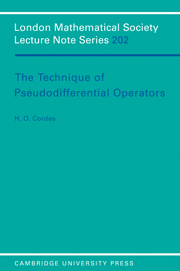Book contents
- Frontmatter
- Contents
- Preface
- Chapter 0 Introductory discussions
- Chapter 1 Calculus of pseudodifferential operators
- Chapter 2 Elliptic operators and parametrices in ℝn
- Chapter 3 L2-Sobolev theory and applications
- Chapter 4 Pseudodifferential operators on manifolds with conical ends
- Chapter 5 Elliptic and paraolic problems
- Chapter 6 Hyperbolic first order systems
- Chapter 7 Hyperbolic differential equations
- Chapter 8 Pseudodifferential operators as smooth operators of L(H)
- Chapter 9 Particle flow and invariant algebra of a semi-strictly hyperbolic system; coordinate invariance of Opψxm.
- Chapter 10 The invariant algebra of the Dirac equation
- References
- Index
Preface
Published online by Cambridge University Press: 09 February 2010
- Frontmatter
- Contents
- Preface
- Chapter 0 Introductory discussions
- Chapter 1 Calculus of pseudodifferential operators
- Chapter 2 Elliptic operators and parametrices in ℝn
- Chapter 3 L2-Sobolev theory and applications
- Chapter 4 Pseudodifferential operators on manifolds with conical ends
- Chapter 5 Elliptic and paraolic problems
- Chapter 6 Hyperbolic first order systems
- Chapter 7 Hyperbolic differential equations
- Chapter 8 Pseudodifferential operators as smooth operators of L(H)
- Chapter 9 Particle flow and invariant algebra of a semi-strictly hyperbolic system; coordinate invariance of Opψxm.
- Chapter 10 The invariant algebra of the Dirac equation
- References
- Index
Summary
It is generally well known that the Fourier-Laplace transform converts a linear constant coefficient PDE P(D)u=f on Rn to an equation P(ξ)u˜ (ξ)=f˜ (ξ), for the transforms u˜, f˜ of u and f, so that solving P(D)u=f just amounts to division by the polynomial P(ξ). The practical application was suspect, and ill understood, however, until theory of distributions provided a basis for a logically consistent theory. Thereafter it became the Fourier-Laplace method for solving initial-boundary problems for standard PDE. We recall these facts in some detail in see's 1-4 of ch.0.
The technique of pseudodifferential operator extends the Fourier-Laplace method to cover PDE with variable coefficients, and to apply to more general compact and noncompact domains or manifolds with boundary. Concepts remain simple, but, as a rule, integrals are divergent and infinite sums do not converge, forcing lengthy, often endlessly repetitive, discussions of ‘finite parts’ (a type of divergent oscillatory integral existing as distribution integral) and asymptotic sums (modulo order −∞).
Of course, pseudodifferential operators (abbreviated ψdo's) are (generate) abstract linear operators between Hilbert or Banach spaces, and our results amount to ‘well-posedness’ (or normal solvability) of certain such abstract linear operators. Accordingly both, the Fourier-Laplace method and theory of ψdo's, must be seen in the context of modern operator theory.
To this author it always was most fascinating that the same type of results (as offered by elliptic theory of ψdo;'s) may be obtained by studying certain examples of Banach algebras of linear operators. The symbol of a ψdo has its abstract meaning as Gelfand function of the coset modulo compact operators of the abstract operator in the algebra.
- Type
- Chapter
- Information
- The Technique of Pseudodifferential Operators , pp. xi - xiiPublisher: Cambridge University PressPrint publication year: 1995

